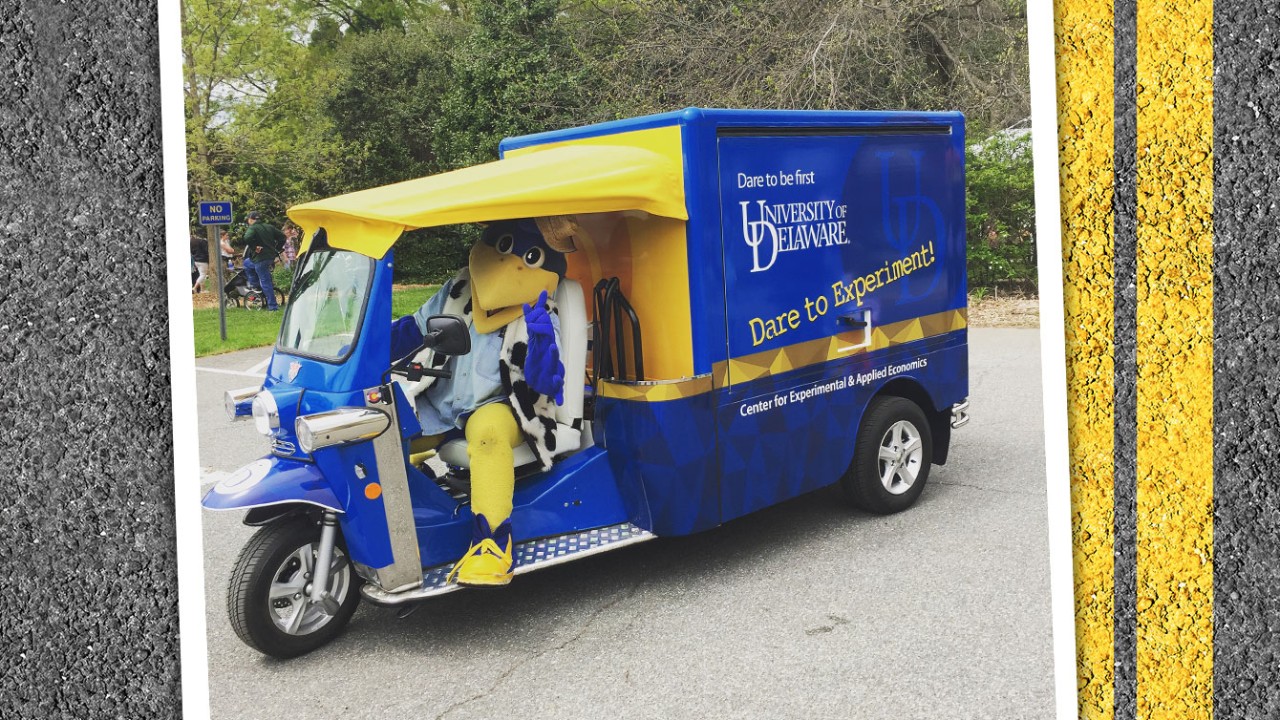


UD’s first Tuk Tuk
Photo by Maddi Valinski June 14, 2016
UD Department of Applied Economics and Statistics’ new tuk tuk supports mobile research efforts
The University of Delaware’s Kent Messer was looking for something that would allow him and his research team from the Center for Experimental and Applied Economics (CEAE) to stand out in a crowd and drum up participation when they travel to locations for their experiments, while at the same time, being able to serve all of their research needs.
Upon returning from a recent trip to Thailand, Messer, the Unidel Howard Cosgrove Chair for the Environment, director of the CEAE and co-director of the Center for Behavioral and Experimental Agri-Environmental Research (CBEAR) in the University’s College of Agriculture and Natural Resources (CANR), found the vehicle that would be truly unique to the state of Delaware: a tuk tuk.
“Social scientists always want to recruit a representative sample of participants for their research, but recruiting has become increasingly difficult as people’s lives have become so busy. We needed something that was attractive and instantly welcoming. People smile when they see our tuk tuk and they approach us wanting to learn more,” said Messer.
UD’s tuk tuk is a sort of three-wheeled motorized rickshaw decked out in UD colors and logos that arrived the night before Ag Day and made its debut at the event where it garnered much attention.
Maddi Valinski, lab manager for CEAE and program administrator for CBEAR, said that at one point when she was riding in the tuk tuk with Leah Palm-Forster, assistant professor in the Department of Applied Economics and Statistics (APEC), who was driving it at Ag Day, about 50 kids descended on the tuk tuk.
“The tuk tuk is very eye catching, and really draws people in. It’s a great way to connect with people and get them interested in our research, more so than just handing out flyers. I think the tuk tuk was part of the reason we were so successful at Ag Day this year. We had over 750 people participate in research compared to 500 last year, which is an incredible increase,” said Valinski.
The tuk tuk is a mobile lab that runs off of electricity and can be set up to charge 30 computers inside or house whatever equipment the center needs to run its experiments, such as a fryer or a refrigerator.
“Whatever our experiment needs are—for oyster experiments or other consumer experiments—we can customize it similar to the way you would customize a food truck,” Valinski said.
It was designed with the help of Keith Heckert, creative and branding director in the UD Communications and Public Affairs office, and has the departmental name and the center’s name, as well as ‘Dare to Experiment,’ emblazoned on the sides.
The tuk tuk can only get up to 25 miles per hour so taking it to far away locations requires it to be towed with a trailer, although it is street legal.
Funding for the tuk tuk came from APEC, and Valinski said that Tom Ilvento, chair of the department, was great in supporting it and recognizing that it would be a great resource, not just for the center but also for the rest of the department.
The mobile lab equipment and computers were purchased through the funding support of the Delaware Experimental Program to Stimulate Competitive Research (EPSCoR).
The tuk tuk will be seen throughout Delaware this summer as it will be used for research on the UD campus, near the UDairy Creamery, and on the Cape May-Lewes Ferry. It has also earned a spot at the United States Department of Agriculture’s farmers market on the National Mall in Washington, D.C.
Contact Us
Have a UDaily story idea?
Contact us at ocm@udel.edu
Members of the press
Contact us at 302-831-NEWS or visit the Media Relations website

